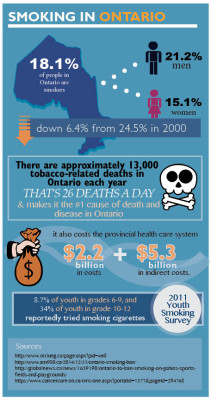STORY BY JASMINE ANTHONY
Being a smoker in Ontario is becoming less and less convenient.
As of Jan. 1, the province has changed the Smoke Free Ontario Act to help smokers quit, protect citizens from second-hand smoke and prevent youth from starting the habit.
The regulations include a ban on smoking on or near children’s playgrounds, publicly owned sports fields, as well as restaurant and bar patios. The bill also prohibits the sale of tobacco on college and university campuses.
The Marquee, Trafalgar Campus’ popular bar, has a patio where smokers used to gather under heated lamps during their evenings out. Now, anyone looking to light up must leave their drinks behind and go to a designated smoking spot farther away from the bar.
“What’s the point of that patio now? There’s literally no use for it anymore,” said Sean Richman, 23, a fourth-year Illustration student.
Also affecting smokers at Sheridan is the looming ban on smoking on campus property, slated to take effect in September.
“They’re trying to get rid of the smoking spots at Sheridan, and that’s just ridiculous. It’s almost like discrimination,” Richman said.
While some students are disgruntled about the change, many people province-wide are seeing this new legislation as a step in the right direction.
Associate Minister of Health and Long-Term Care Dipika Damerla says that reaction to the smoking on patios ban has been largely positive.
MORE RELATED TO THIS STORY:
“There is an increase in recognition by society that smoking should not be considered cool. This is a way of de-normalizing smoking,” Damerla said during a phone interview.
Damerla also said that the “genesis” of this legislation is about recognizing the fact that second-hand smoke is injurious and that it hurts non-smokers.
Looking to the future, Damerla anticipates future legislation that will ban the sale of flavoured tobacco and menthol cigarettes.
According to a statistic on Ontario.ca, nearly half of young smokers used flavoured tobacco in 2013.
“One thing research shows is that if someone doesn’t smoke by 24, it is highly likely they will never smoke.
“All of these changes are aimed at how we can stop youth from smoking,” Damerla said.

